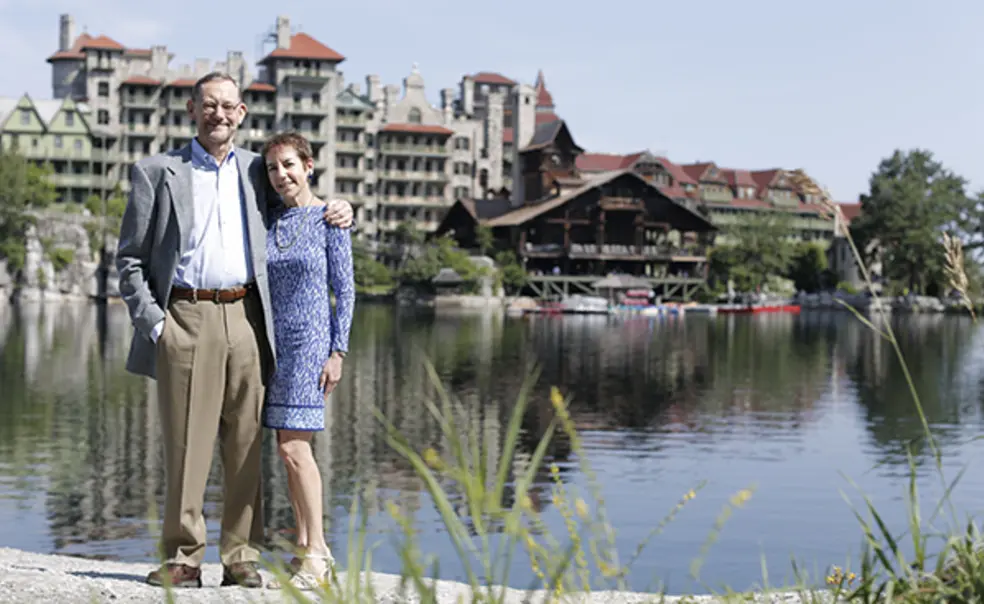Bert Smiley *78 and Nina Feldman-Smiley *79 Manage an Iconic Resort in New York State
In 1990, Bert Smiley *78 and Nina Feldman-Smiley *79 were pursuing successful careers in Washington, D.C. — Bert as an economist in the Department of Justice’s antitrust division and Nina as associate director of research at the public relations firm Porter Novelli — when they were offered the opportunity to leave the city and manage Bert’s historic family property, Mohonk Mountain House in New Paltz, N.Y.
“Nina and I took a walk in the park in Washington, and we talked it over, and we decided to make a midlife career change, to put it mildly,” Bert says. “We decided to become innkeepers at Mohonk.”
Today, Bert serves as president and Nina is director of mindfulness programming at the resort, a National Historic Landmark that includes 1,325 acres of surrounding land. It was built in 1869 by Albert Smiley, Bert’s great-grand-uncle, and has been managed by the Smiley family since its inception.
“I do believe we are the only two Princeton Ph.D.s in the country, perhaps in the world, running an iconic resort hotel,” Nina says.
Bert and Nina met on a blind date, and after they were married, they applied to Princeton together for graduate school, arriving on campus in 1974. Nina pursued her Ph.D. in psychology, while Bert joined the economics department.
Bert, who had majored in mathematics as an undergrad, was fascinated by industrial and antitrust policy. Although he had never taken an economics class, Princeton’s economics program was appealing to him, since it had a mathematical bent.
“I would have to say I was a high-risk student,” he says. “But [Princeton] was willing to take a chance on me, and that was a transformative thing in my life.” He studied under professors Richard Quandt ’52 and Steve Goldfeld, and finished his Ph.D. in four years.
Nina studied psychology under professors Diane Ruble and Tory Higgins, with a focus on social cognition and development. While their studies kept the couple busy, they enjoyed interacting with fellow students and faculty. “It really felt like a community,” Nina says. “Meeting people who were so smart, and so focused, and so interesting, was a wonderful experience.”
Bert had spent his entire childhood at Mohonk Mountain House, so the decision to manage the resort was not completely unexpected. And Nina, with her background in the public relations world, found her niche directing Mohonk’s marketing until 2016, when she devoted her time to expanding mindfulness programs. The people who visit Mohonk “come here to relax, refresh, and renew themselves in a beautiful natural setting,” says Nina, who recently co-authored the book Mindfulness in Nature with her twin brother, David Harp.
With the advent of sites like Airbnb, one might wonder about the ability of traditional resorts like Mohonk to appeal to younger vacationers. Nina notes that Mohonk’s varied activities — from rock climbing to horseback riding to lounging in one of its 600 rocking chairs — appeal to those who value having options. And Bert sees in Mohonk’s buildings a timeless appeal, adding that millennials value authentic experiences.
“Here we sit with our 148-year-old facility and outdoor activities … and six generations of family involvement,” he says. “Mohonk is nothing if not authentic.”












1 Response
Betty Noyes
8 Years AgoBert and Nina are to be...
Bert and Nina are to be admired and appreciated ! They are truly great people that are a tremendous credit to your fine institution!